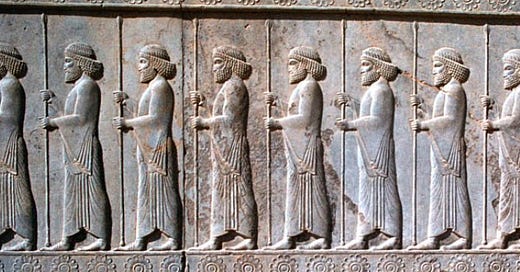Grokking þe History of Antiquity: Ancient Stories of Élites Already More þan Half-Transformed into Myth
Should we read Steven Pressfield's "Gates of Fire" & Herodotos's "History" & THEIR STORY of Leonidas & his 300 at Thermopylai? Is pro-Spartan Herodotean propaganda good for us?...
Picking a bone:
I believe I have a bone to pick with the extremely sharp and thoughtful Bret Devereaux today:
Bret Devereaux: ‘I’m back, writing for Foreign Policy on why ancient Sparta is unworthy of modern emulation and in particular the US military’s love affair with all things Spartan is both inappropriate and hazardous…. They didn’t hold the Persians back. Leonidas lost the battle of Thermopylae; he only buys a three day delay, which turns out to be entirely inconsequential for the campaign…. The Greek victory comes at Plataea fully a year later…
And
Bret Devereaux: Spartans Were Losers: The U.S. military’s admiration of a proto-fascist city-state is based on bad history: ‘Much of this tendency to imagine U.S. soldiers as Spartan warriors comes from Steven Pressfield’s historical fiction novel Gates of Fire, still regularly assigned in military reading lists. The book presents the Spartans as superior warriors from an ultra-militarized society bravely defending freedom (against an ethnically foreign “other,” a feature drawn out more explicitly in the comic and later film 300). Sparta in this vision is a radically egalitarian society predicated on the cultivation of manly martial virtues. Yet this image of Sparta is almost entirely wrong. Spartan society was singularly unworthy of emulation or praise, especially in a democratic society…
And Bret is backed up and reinforced by the equally sharp:
John Ma: ‘The image of super warriors maybe not the best for a democratic army?… It encourages elite supermen fantasies as historically true. Judging by reactions to debunking blogs+ tweets by historians @BretDevereaux and @Roelkonijn superman fantasies are prevalent in certain circles. Not good for armed forces and police which serve democratic society. So it might matter to show that mythical Spartans are just that, mythical, then that the myth is based on a violent, stratified, oligarchical society, and that it took that social setup to produce full-time gentleman soldiers, which is not appropriate for our pluralist democracy…
Let me say that I very much liked Steven Pressfield’s Gates of Fire: I think it is quite a good and absorbing book. And it was a fine thing for me to read. (as opposed to say, the movie “300”, which I found painful and annoying to watch—although even that is more subtle than most of its fanboys realize—what dooms Leonidas and his 300 is their übermensch-philosophy declaration that there is no place for the deformed Ephialtes in the Spartan line-of-battle.)
I recommend Gates of Fire highly.
Keep reading with a 7-day free trial
Subscribe to Brad DeLong's Grasping Reality to keep reading this post and get 7 days of free access to the full post archives.





